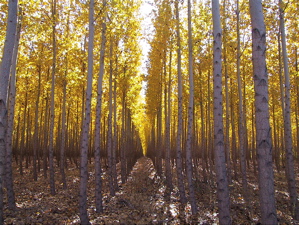
It’s rewarding to see multiple areas of science coming together in a positive direction. We’ve covered this topic earlier here — it’s worth keeping up-to-date with the latest published work.
Wood from a common tree may one day factor prominently in meeting transportation fuel needs, according to scientists whose research on the fast-growing poplar tree is featured on the cover of [a recent] edition of the journal Science. The article, highlighting the analysis of the first complete DNA sequence of a tree, the black cottonwood or Populus trichocarpa, lays the groundwork that may lead to the development of trees as an ideal “feedstock” for a new generation of biofuels such as cellulosic ethanol.
“Biofuels could provide a major answer to our energy needs by giving the United States a homegrown, environmentally friendlier alternative to imported oil,” said DOE’s Under Secretary for Science Dr. Raymond L. Orbach.
“Fine-tuning plants for biofuels production is one of the keys to making biofuels economically viable and cost-effective. This research, employing the latest genomic technologies, is an important step on the road to developing practical, biologically-based substitutes for gasoline and other fossil fuels.”
“Biofuels emit fewer pollutants than fossil fuels such as gasoline. In addition, poplar and related plants are vital managers of atmospheric carbon. Trees store captured carbon dioxide in their leaves, branches, stems, and roots.
This natural process provides opportunities to improve carbon removal from the air by producing trees that effectively shuttle and store more carbon below ground in their roots and the soil. Moreover, bioenergy crops re-absorb carbon dioxide emitted when biofuels are consumed, creating a cycle that is essentially carbon neutral.”
The earlier post referred to up top — from work at Purdue — dealt more with questions about developing poplar plantations.
New directions in hybridizing tree stocks are fascinating. This latest road map will enable many new directions of research — all of it facilitated by advances in modern genetics.















How soon until the oil companies, backed by an OIL funded administration, has this shut down, or slandered as a crack-pot science?
This is the kind of research we should be doing. It does two things for us.
1. lowers our dependance on foreign oil (it may not negate it totally, but it will lower it)
2. produces a cleaner environment.
Now, the automakers need to get on board with tweeking their cars and TRUCKS to run more efficently on this biofuel.
I just can’t wait for the tree-huggers to make the same stink about this as they do the lumber industry… while totally disregarding the fact that millions of acres of new trees are planted each year for the express purpose of replacing the one which are cut down.
Don’t feed the troll!
#2
You also forgot that in the last moment an idiot will pop in along with a small army of lawyers claiming that the “scientist” patented a specific piece of the genome and that if their client doesn’t get a substantial share of the profit then they will use their legal powers to shut down the entire project.
useing Wood alcohol creates methane…
Mike @ #2 – I’m guessing you haven’t met any actual tree huggers.
Here are four specific complaints I have against the timber companies.
First, and most serious, is they have plenty of their own damned trees to harvest. I’m unclear why I should subsidize (e.g. take a loss) their exploitation of the public lands. Especially the old growth trees, which are much more valuable to society in place vs converted into sawdust.
Second, there are always winners and losers and under the current rules lumber companies win at the expense of all other economic activities. Such as fishing, recreation, flood control, water quality, eco-tourism (e.g. preserving wetlands for birding; birdwatching is huge money), and preserving biodiversity (e.g. hunting).
Third, with horrible long-term consequences, is the continued conversion of timber lands into urban sprawl. We all subsidize that activity. To our own determent.
Fourth, timber companies only deligently replant their own lands. Nationally and internationally, timber companies are freeloaders. Meaning they cheat. And enforcement of the rules, like making sure they replant after a clear cut, has consistly been cut back so that there’s effectively no enforcement.
So, Mike, in summary, I respectfully ask that you please acquaint yourself with the issues before you pass judgement.
Or not. Your choice.
Angel H Won @ #4 – Huh?